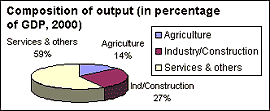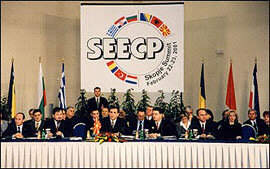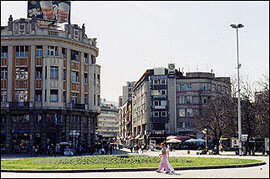 ECONOMIC OUTLOOK ECONOMIC OUTLOOK |

The Republic of Macedonia is a developing country. Its economy is in the process of transition. Macedonia is prized today as the crossroads and axis of the Balkan region. It has great military strategic importance in a region that has been politically volatile for years. Maintaining a peaceful and prosperous Macedonia has become of great importance to the US and Europe. It is the hub of the Balkans, and the stability of the entire region depends on its wellbeing. Hence, Macedonia has received extensive assistance from foreign economic institutions such as the World Bank, the IFC, EBRD. It has been recognized for its outstanding achievements, including rapid and textbook economic reforms, continued stability (and even economic growth) during the time of the Kosovo situation on its Northern border. Macedonia has facilitated regional trade agreements, and even hosted the Summit of Heads of State and Government of the South East European Cooperation Process Economic Forum.

Macedonia's role has been recognized by the European
Community for preventing a refugee crisis throughout
Europe by allowing 300,000 Kosovar Albanians to
encamp on its Northern border while Kosovo was occupied
by the Serbian military troups. Macedonia has also
received the unique distinction of being the only
non-NATO country in the world to have had, and currently
still have, NATO forces operating from within its
borders. With then stable international and diplomatic
relations with Europe and the West, Macedonia was
a well-prepared host to the thousands of refugees,
diplomats, journalists, aid workers, and NATO and
KFOR troops, all of whom still have a presence in
Macedonia. The Albanian refugees, however, have
since returned home. |
Today Macedonia works in very close relationship with the major world economic bodies to reach the goal of inclusion in the EU in the next round of expansion, and to join NATO as it expands in 2003. In many respects, Macedonia's sense of independence has been handed over to the world bodies as they have surrendered economic sovereignty of many of its state-owned institutions in order to receive continued economic support from abroad. Macedonia is hoping to be included into the EU, so they are taking steps to ensure compliance with standards in accounting, banking, financing and legal protection for investors as well as the protection of intellectual property rights. In return, they receive technical assistance allowing a rapid restructuring of its economy.

Macedonia is continually the feather in the cap of the World Bank, and even the World Bank president says that if every country had results like Macedonia, that his job would be much easier.
With the collapse of the former Yugoslavia, the market available for Macedonian goods shrunk from nearly 70 million people to its current domestic market of 2 million. Coupled with the situation in Kosovo, and an embargo levied by Greece over its claim to the name of Macedonia, the 90s were a very difficult time for the budding democracy. But they have taken initiative, and played an active role in creating regional trade agreements to rebuild their economy. A trade pact with Ukraine ensures a market of 100 million, while guaranteeing a reliable source of items not produced in Macedonia like grains, cereals and fabrics. By working with other maligned economies in Central Asia and the Middle East, they are ensuring a prosperous future in the event they do not receive inclusion into the EU. |

